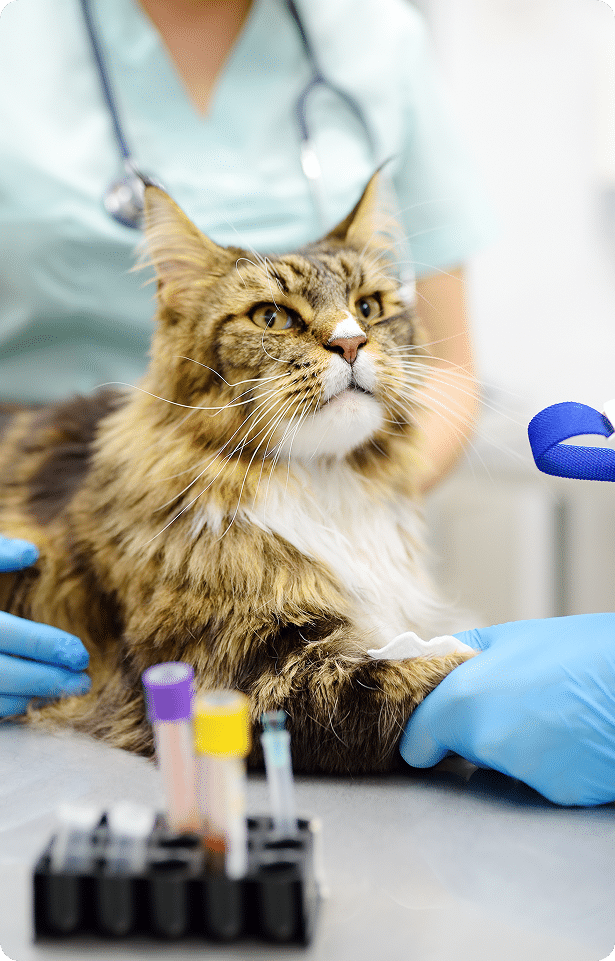Diagnostics
Accurate veterinary diagnostics in Minnetonka including X-rays, ultrasound, ECG, and in-house lab testing at Gehrman Animal Hospital.
Veterinary Diagnostics for Cats and Dogs in Minnetonka, MN | Gehrman Animal Hospital
When your pet isn’t feeling their best, you want answers fast. Diagnostic testing is one of the most valuable tools veterinarians use to uncover the cause of a pet’s symptoms and begin the right treatment. Whether your dog has been limping or your cat isn’t eating like usual, veterinary diagnostics provide important insight into what’s going on inside your pet’s body.
Gehrman Animal Hospital in Minnetonka offers a full range of diagnostic services for cats and dogs. Using advanced imaging and laboratory tools, our compassionate and highly skilled team works together to identify issues quickly and accurately. Conveniently located in Minnetonka, our hospital proudly serves the surrounding west metro area.

Our Diagnostic Capabilities
Getting to the root of a health concern starts with the right tools. At Gehrman Animal Hospital, we combine compassionate care with advanced diagnostic technology to help uncover what’s affecting your cat or dog—often in the same visit. Whether it’s unexplained symptoms, pre-surgical screening, or routine wellness testing, our diagnostics are designed to deliver clear answers, quickly and comfortably. Here’s a look at the key diagnostic services we provide:

Digital Radiography (X-rays)
Digital X-rays offer fast, detailed images of bones, joints, and organs, helping to detect fractures, arthritis, tumors, foreign bodies, and certain heart or lung conditions. The procedure is quick, non-invasive, and comfortable for pets.
Ultrasound & Echocardiogram (Echo)
Ultrasound uses sound waves to create live images of internal organs, which is ideal for examining the abdomen, liver, kidneys, bladder, and the gastrointestinal system. Echocardiograms focus on heart structure and function, aiding in the diagnosis of valve disease, heart enlargement, and congenital conditions.
In-House Laboratory Testing
Our on-site lab allows for rapid diagnostics with tests like:
- CBC and chemistry panels:
Identifies infection, anemia, and organ health
- Urinalysis: Screens for kidney disease, diabetes, and infections
- Fecal exams: Detects parasites and digestive issues
- Cytology: Analyzes skin growths and samples
- Tick-borne disease testing: Diagnoses illnesses like Lyme disease
Having lab results in-house enables faster treatment decisions, especially in urgent cases.
Electrocardiogram (ECG) & Blood Pressure Monitoring
ECG measures the heart’s electrical activity to detect arrhythmias and monitor cardiac health, especially before anesthesia or in chronic conditions. Blood pressure monitoring is important for evaluating circulatory function, particularly in senior pets or those with kidney and heart disease.
Collaborative Care You Can Count On
When your pet needs testing, you deserve a veterinary team that moves quickly, communicates clearly, and treats your companion like one of their own. That’s exactly what you’ll find at Gehrman Animal Hospital. Our approach to diagnostic care is built on efficiency, compassion, and trust.
Same-Day Results in Many Cases
Our on-site lab and imaging equipment allow us to provide fast results—often the same day—so your pet can get timely care without long waits.
Collaborative Team Approach
Veterinarians and certified veterinary technicians work side by side to ensure accurate diagnostics and seamless care, with clear communication every step of the way.
Supportive, Family-Centered Care
Pets are treated with the same care and respect as family. We focus on comfort, safety, and low-stress handling to keep your pet at ease during diagnostics.
Privately Owned and Relationship-Focused
As an independent clinic, we prioritize long-term relationships, offering consistent, compassionate care from a team you know and trust.
Convenient West Metro Location
Our Minnetonka hospital is easy to reach from Wayzata, Plymouth, Maple Grove, Hopkins, and surrounding communities—just minutes from your doorstep.
If you’re looking for more than just test results—for a team that genuinely cares and works with you every step of the way—Gehrman Animal Hospital is the place for your pet’s diagnostic needs.
Serving Pets Across Minnetonka and Beyond
Gehrman Animal Hospital proudly provides diagnostic care to cats and dogs in Minnetonka and the surrounding west metro area. Our clients choose our clinic for its convenient location, experienced team, and relationship-focused approach.
Many diagnostic results are available the same day, helping reduce stress and start treatment quickly. Whether you need fast answers or a second opinion, we’re here to support your pet’s health and we are just a short drive away.
When to Consider Diagnostic Testing
Even small changes in your pet’s behavior or health can signal something more serious. Diagnostic testing helps identify issues early—often before symptoms worsen—allowing us to start treatment sooner and improve outcomes. If your cat or dog is showing any of the following signs, it may be time to schedule an evaluation:
- Vomiting or diarrhea – Can indicate gastrointestinal upset, infections, parasites, or organ dysfunction
- Limping or signs of pain – May be caused by injury, arthritis, or joint disease
- Coughing or breathing changes – Could signal respiratory infections, heart issues, or lung problems
- Unexplained weight loss or gain – May be linked to thyroid disease, diabetes, or digestive issues
- Lethargy or behavioral changes – Includes hiding, vocalizing, or changes in bathroom habits
- Appetite changes – Eating significantly more or less than usual
- Excessive drinking or urination – A possible sign of diabetes, kidney disease, or hormonal imbalance
Even if symptoms seem minor, they could be a clue that something isn’t right. Diagnostic testing can help uncover the cause and guide the next steps in your pet’s care.

Take the First Step Towards Answers | Schedule Pet Diagnostic Testing Today!
If your cat or dog is showing signs of illness or just doesn’t seem like themselves, Gehrman Animal Hospital is here to help. Using advanced diagnostic tools, a skilled and compassionate staff, and a collaborative, community-centered approach, we’ll work with you to uncover the cause and support your pet every step of the way. To schedule an appointment or speak with our team, call us at (952) 545-9161.

Do you still have questions?
Call us at (952) 545-9161 or email us at reception@gehrman-animal.com.
FAQs
Frequently Asked Questions About Veterinary Diagnostics
What kinds of conditions can veterinary diagnostics detect?
Diagnostics help uncover infections, organ dysfunction, hormonal imbalances, bone injuries, heart problems, tumors, and more. They’re important in both routine checkups and emergency care.
Do pets need to be sedated for X-rays or ultrasounds?
Most pets do not need sedation, especially for simple X-rays or abdominal ultrasounds. For wiggly or anxious pets, light sedation may be recommended for clearer images and comfort.
How quickly will we get test results?
In-house test results are available on the same day. Routine diagnostics (fecal samples, pre-op labs) are available in 1 to 3 days. Specialized testing can take anywhere from 5 to 10 days depending on the lab and complexity.
Are diagnostic tests safe for senior pets?
Yes, diagnostic testing is especially important for senior pets to detect age-related conditions early. We take every precaution to keep them safe and comfortable.
How can I prepare my pet for a diagnostic appointment?
Some tests may require fasting or a full bladder. We’ll give you clear instructions ahead of time so your pet is ready and comfortable during the visit.

